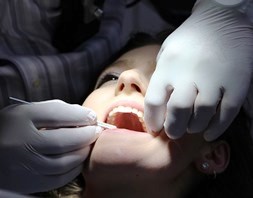Dental Hygiene Training Programs
How to Enroll In the Right One Near Rutland Illinois
 A critical first step to start your new career in preventive dentistry is to enroll in the ideal dental hygienist school near Rutland IL. But before you can make your selection, you must evaluate and compare your school options. There is much more to doing your due diligence than choosing the training with the least expensive tuition or enrolling in the school that is nearest to your home. There are other crucial issues to take into account also, including the program's accreditation and reputation. A dental hygienist generally must invest anywhere from two to three years to earn an Associate Degree, as compared to a certificate most often earned by dental assistants in about half that time. Naturally with the more extensive training of a hygienist comes more cost. We will talk about all of these considerations and supplemental questions that you need to be asking the dental hygienist schools you are looking at later in this article. But first, let's review the duties of dental hygienists and the training programs provided.
A critical first step to start your new career in preventive dentistry is to enroll in the ideal dental hygienist school near Rutland IL. But before you can make your selection, you must evaluate and compare your school options. There is much more to doing your due diligence than choosing the training with the least expensive tuition or enrolling in the school that is nearest to your home. There are other crucial issues to take into account also, including the program's accreditation and reputation. A dental hygienist generally must invest anywhere from two to three years to earn an Associate Degree, as compared to a certificate most often earned by dental assistants in about half that time. Naturally with the more extensive training of a hygienist comes more cost. We will talk about all of these considerations and supplemental questions that you need to be asking the dental hygienist schools you are looking at later in this article. But first, let's review the duties of dental hygienists and the training programs provided.
It Takes Just a Few Minutes to Start Your Dental Hygienist Career Below
Dental Hygienist Job Functions

When contrasting the job of a dental hygienist to that of an assistant, the most significant difference is undoubtedly that the hygienist works more independently. Dental assistants work with and in support of the Rutland IL practice and the dentists. Hygienists, while also assisting the practice, deal with the patients more on an individual basis. They are typically the first person a patient sees when called from the waiting room. They examine every patient's gums and teeth and report their findings to the dentists. They also may carry out basic procedures. Based on state law, a hygienist's responsibilities can include:
- Removing plaque, tartar and stains
- Applying fluoride treatments
- Applying sealants and polishing teeth
- Teaching patients about oral hygiene
- Taking X-rays and developing film
- Removing sutures and applying fillings
Dental Hygienist Training Options
Due to the added responsibility as compared to an assistant, dental hygienists working in Rutland IL dental offices are generally required to have an Associate Degree in dental hygiene rather than a certificate. These programs can take anywhere from 2 to as long as 3 years to complete and must be accredited by the CDA in nearly every state. They are offered in community colleges as well as trade and technical schools. And in addition to classroom studies learning the fundamentals of dental hygiene, there will be a clinical aspect to the training as well. Many programs also offer internships with local dentists or dental practices.Online Dental Hygienist Colleges
 Choosing an online dental hygienist program might be a viable alternative for obtaining your training. Just keep in mind that the program will not be totally online, since there will be a practical portion to your training. But the balance of your classes will be provided via your desktop computer in the convenience of your Rutland IL home or elsewhere on your tablet or laptop. For those working while going to college, online dental classes make education much more accessible. Some may even have lower tuition rates than their on-campus competitors. And supplementary expenses for items like commuting, books and school supplies may be reduced also. The clinical training can typically be completed at an area dental office or in an on-campus lab. With both the online and clinical training, everything required to obtain the appropriate education is furnished. If you have the discipline for this method of education, you might find that attending an online dental hygienist college is the ideal option for you.
Choosing an online dental hygienist program might be a viable alternative for obtaining your training. Just keep in mind that the program will not be totally online, since there will be a practical portion to your training. But the balance of your classes will be provided via your desktop computer in the convenience of your Rutland IL home or elsewhere on your tablet or laptop. For those working while going to college, online dental classes make education much more accessible. Some may even have lower tuition rates than their on-campus competitors. And supplementary expenses for items like commuting, books and school supplies may be reduced also. The clinical training can typically be completed at an area dental office or in an on-campus lab. With both the online and clinical training, everything required to obtain the appropriate education is furnished. If you have the discipline for this method of education, you might find that attending an online dental hygienist college is the ideal option for you.
Subjects to Ask Dental Hygienist Colleges
Now that you have decided to become a dental hygienist in Rutland IL, you can start the process of comparing programs and schools. As we discussed at the start of this article, a number of prospective students start by looking at the location and the cost of the schools. Perhaps they search for several online alternatives also. Even though these are significant initial points to consider, there are a few additional questions that you should ask of the programs you are reviewing in order to make an informed decision. Toward that end, we have supplied a list of questions to assist you with your evaluation and ultimate selection of the best dental hygienist college for you.
Is the Dental Program Accredited? There are several important reasons why you should only choose an accredited dental hygienist school. If you are intending to become certified or licensed, then accreditation is a prerequisite in almost all states. To qualify to take the National Board Dental Hygiene Exam, your dental program must be accredited by the Commission on Dental Accreditation (CDA). Accreditation also helps ensure that the training you receive is of the highest quality and comprehensive. Rutland IL employers typically desire or require that new hires are graduates of accredited colleges. And last, if you are applying for financial aid or a student loan, usually they are not provided for non-accredited schools.
Is Sufficient Clinical Training Provided? Clinical or practical training is an essential portion of every dental training program. This is true for the online college options as well. Most dental hygienist colleges have associations with local dental practices and clinics that provide clinical training for their students. It's not only imperative that the school you enroll in offers sufficient clinical hours but also provides them in the type of practice that you subsequently would like to work in. For example, if you are interested in a career in pediatric dentistry, confirm that the school you choose offers clinical rotation in a local Rutland IL dental office that specializes in dental treatment for children.
Are Internships Available? Find out if the dental schools you are looking at have internship programs. Internships are probably the most effective method to receive hands-on, practical experience in a professional dental practice. They help students to transition from the theoretical to the practical. They can also help students form working relationships in the professional dental community. And they look good on resumes also.
Is Job Placement Support Provided? Many graduating students of dental hygienist colleges need assistance landing their first job. Check if the schools you are researching have job placement programs, and what their job placement rates are. Programs with high job placement rates are likely to have good reputations within the Rutland IL dental profession in addition to extensive networks of contacts where they can refer their students for employment or internships.
Are Classrooms Small? Ask the colleges you are evaluating how large on average their classes are. The smaller classes generally offer a more personal environment for training where students have greater access to the instructors. Conversely, bigger classes can be impersonal and offer little one-on-one instruction. If feasible, find out if you can attend a few classes at the Rutland IL dental hygienist college that you are leaning toward in order to experience first hand the degree of interaction between students and teachers before making a commitment.
What is the Overall Expense of the Program? Dental hygiene colleges can fluctuate in cost depending on the length of the program and the amount of clinical training provided. Other factors, for instance the reputations of the colleges and whether they are public or private also have an impact. But besides the tuition there are other significant costs which can add up. They can include expenses for such things as commuting and textbooks as well as school equipment, materials and supplies. So when analyzing the cost of programs, remember to add all of the costs associated with your education. Most schools have financial aid offices, so make sure to check out what is offered as far as loans, grants and scholarships in the Rutland IL area.
Are the Classes Accessible? Before selecting a dental hygienist school, you need to verify that the hygienist or assistant program furnishes classes that accommodate your schedule. This is especially true if you continue working while acquiring your education and must attend classes near Rutland IL at nights or on weekends. And even if you select an online program, you will still be required to schedule your clinical training classes. Also, while addressing your concerns, ask what the make-up practice is if you should have to miss any classes due to work, illness or family emergencies.
Find Out More About Studying to Become a Dental Hygienist in Rutland
Enroll in the Right Rutland Dental Hygienist Program
Selecting the ideal dental hygienist course is important if you want to take the National Board Dental Hygiene exam or, if mandated in your state, become licensed. As we have covered, there are numerous options available to acquire your education and it takes a relatively short period of time to become a dental hygienist. You can obtain your formal training through dental hygienist programs at community colleges, vocational schools, technical institutes and trade schools. Graduates of these programs usually earn an Associate Degree. Dental Hygienists typically require about two years of studies before they enter the work force. When earning a degree you can elect to go to classes online or on-campus. Whichever mode of training you elect to pursue, by addressing the questions presented in this article you will be better prepared to make the best selection. And as a result, you will be ready to begin your journey toward becoming a dental hygienist in Rutland Illinois.
Rutland How To Become A Dental Hygienist | Rutland Dental Hygienist Courses
